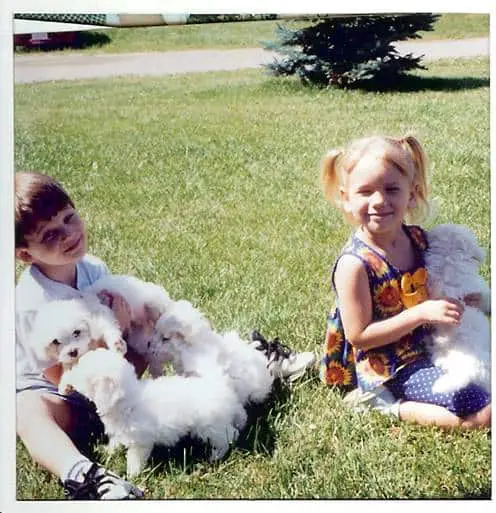Can Bichon Frise live Outside? There is often a question that tends to bother most about the Bichon Frise breed of dogs, and that is often found in the question if they can live outside. So today, we will be addressing this issue, and finally arrive at a conclusion on whether they can survive outside or not. But before that, let’s first have a brief history of how the dog came into existence, how it often looks like, care, and whether or not it can live outside.
Normally, a Bichon can stay outside but not for so long. Long exposure to cold or extreme heat can be harmful to them. Their Heavy Coat will keep them warm but it gets easily matted. On the reverse of that in Hot weather, it makes it hard for them to remain cool.
Can Bichon Frise live Outside / Brief History of Bichon Frise
Bichons are a part of the clan of little white dogs originally known as Barbichon types. (These also include the Bolognese, Havanese, and Maltese.) It is believed that these ancient species began their modern development on Tenerife, the biggest of the Canary Islands.
One of these species became so popular with the island’s sailors that it was known as the Bichon Tenerife, the primary ancestor of today’s Bichon Frise. The breed’s close association with European nobles began sometime in the 13th century. Most notably, they endeared themselves to the royal courts of Spain, Italy, and France, and came into their own during the Renaissance.
With the advent of the French Revolution in 1789, the Bichon’s days as the pampered and perfumed lapdog of aristocrats came to a rude end. One by one the breed’s benefactors were trotted off to prison and the guillotine and their Bichons lost their positions of privilege.
Many were turned out into the street to fend for themselves. Street entertainers took in the bright, agile dogs and trained them to coax a coin or two from passers-by with their antics.
Soon, the Bichon was earning his keep as a circus performer. Trainable, impossibly cute, and always at their best when in the spotlight, Bichons were excellent candidates for showbiz success. In the 20th century, Bichons again faced hard times because of the shortages and austerities brought on by the two world wars. And again, many Bichons found themselves out in the cold.
Thanks to a few fanciers who gathered Bichons off the streets of France and Belgium, the breed survived and was recognized in France under the auspices of the Societé Centrale Canine in1933 as the Bichon a Poil Frisé—the “Bichon of the curly hair.”
The Bichon Frise Club of America was founded in San Diego in 1964. The AKC accepted the Bichon Frise(BF) into the Miscellaneous class in 1971, and full breed recognition in the Non-Sporting Group came two years later.
The Appearance of the Bichon Frise
The BF is a small, sturdy, white powder puff of a dog whose merry temperament is evidenced by his plumed tail carried jauntily over the back and his dark-eyed inquisitive expression. This is a breed that has no gross or incapacitating exaggerations and therefore there is no inherent reason for lack of balance or unsound movement.
Any deviation from the ideal described in the standard should be penalized to the extent of the deviation. Structural faults common to all species are as undesirable in the BF as in any other breed, even though such faults may not be specifically mentioned in the standard.
HOW TO CARE FOR IT
The Bichon Frise should do well on high-quality dog food, whether commercially manufactured or home-prepared with your veterinarian’s supervision and approval. Any diet should be appropriate to the dog’s age (puppy, adult, or senior).
Some dogs are prone to getting overweight, so watch your dog’s calorie consumption and weight level. Treats can be an important aid in training, but giving too many can cause obesity. Learn about which human foods are safe for dogs, and which are not. Check with your vet if you have any concerns about your dog’s weight or diet. Clean, fresh water should be available at all times.
CAN IT SURVIVE OUTSIDE?
Normally, a Bichon can stay outside but not for so long. This is often as a result of some reasons which directly affects the dog whenever it spends a long amount of time outside. Normally they are an Indoor Breed. We lived on Three acres and allowed all our Dogs to roam, But we had provided a heated airconditioned from for them with their own Dog Door.
That way when the weather was agreeable they could play in the fenced-in area, which they loved the freedom. We first used an electric fence with each of our dogs having an electronic collar. The Bichon is very intelligent, quickly understood where it could go and where it could not. We later fenced in our back yard about 2 acres and they had free access to it all. Now, here are some of the reasons why it’s hard for a Bichon dog to survive outside.

Pigment
The pigment of a Bichon’s nose may darken after left to stay outside, to play for a long time during the summer. And while there is no medical or scientific reason as to why this is so, the interesting thing is that that same pigment on the Bichon Frise may lighten with less time spent outside. So logically, it is very clear that the lesser time your Bichon spends outside especially during the hot weather conditions, the lighter its pigment is going to appear.
This is another reason why vet doctors love administering care to any Bichon Frise who is perhaps sick, under blue fluorescent light. The blue rays which produce some degrees of cold prevent the pigment from dimming when they are sick.
But recently, after some series of scientific reaches were conducted on Bichons, it was discovered that the depigmentation, is often an accumulation of melanin that is genetic, and is also a normal response to sun exposure in a white or light-colored breed of dogs such as the Bichon Frise.
They Have a Sociable Nature
The truth is that by nature, Bichon Frise does not love being left alone, especially not when they are outside. Plus, if they are left to stay outdoors, their long, high-maintenance coat may get tangled or matted. So, it’s never a good option to live a Bichon Frise outside for long.
In a nutshell, even though Bichon Frise is a lively and very interesting breed of dogs, they are somethings that don’t really go well with their body. And one of those things is in having them stay outside for a long time.
